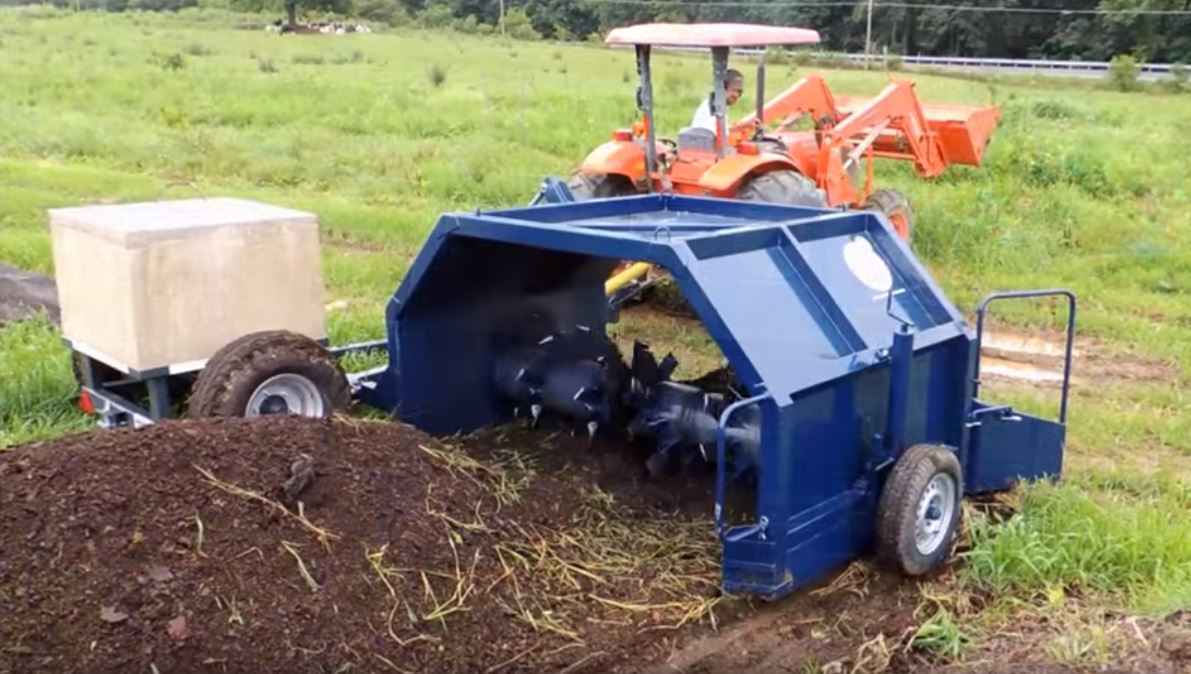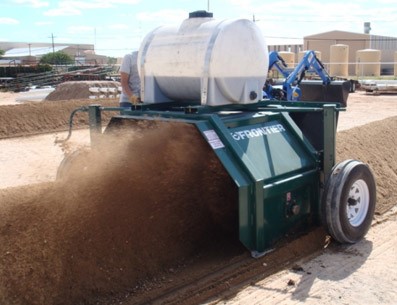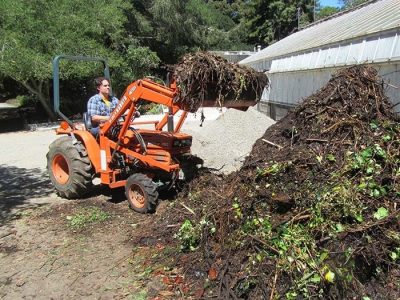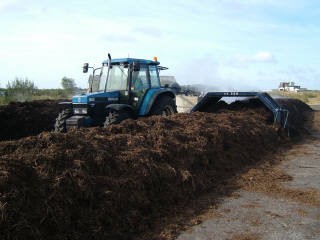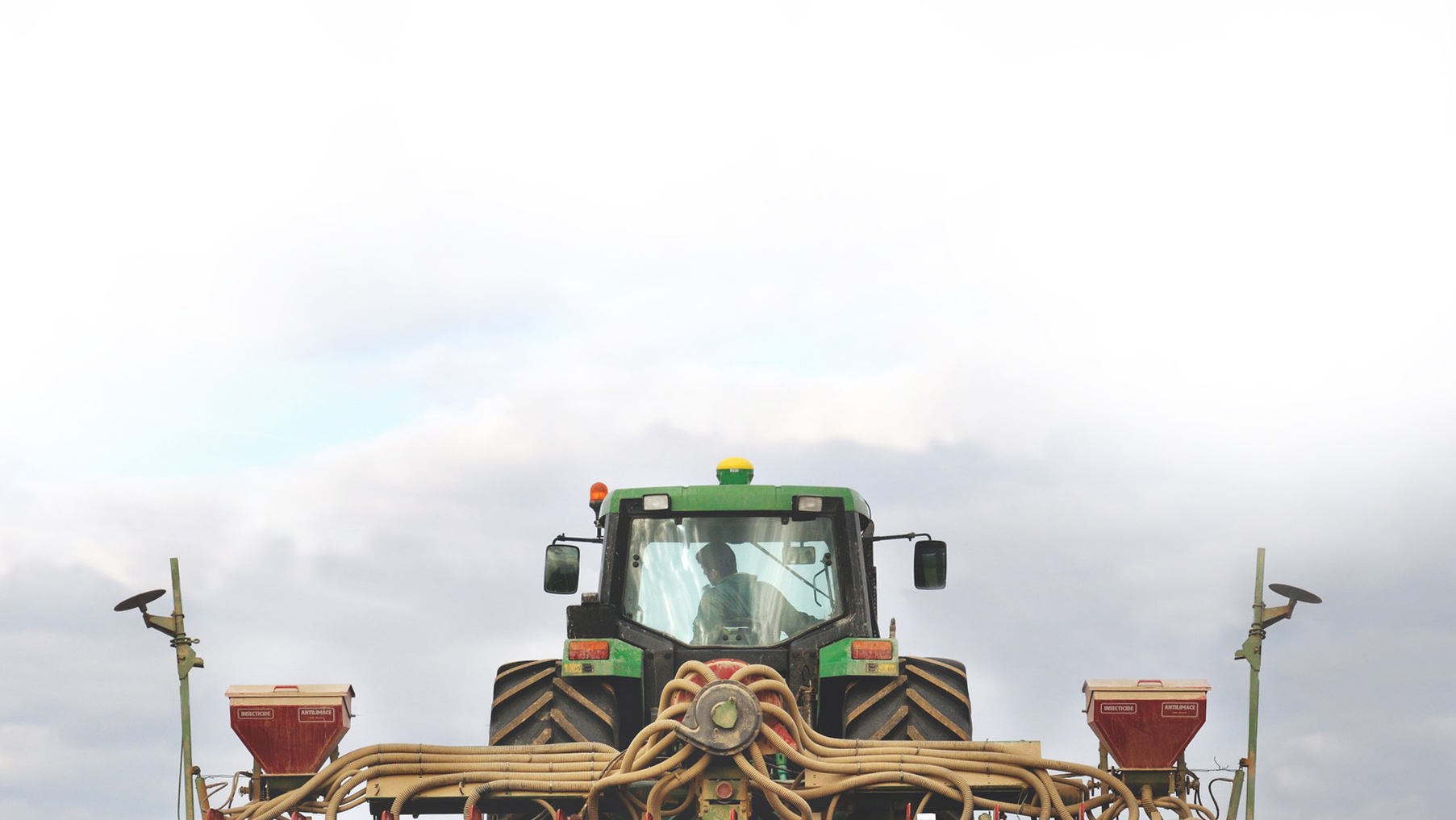Using Small Tractors to Improve Composting Systems in Communities
Composting systems for treatment of wood, fiber, food, animal, and other wastes is an important contributor to mitigating the negative effects of climate change. By composting, we sequester more carbon to the soil, reduce the amount of methane released into the atmosphere by alternative waste management systems, and create a valuable soil conditioning amendment for use in food production.
There are a few different methods used for composting, but it is fairly well established that using aerobic (presence of oxygen) composting methods outperforms anaerobic (absence of oxygen) systems for a few key reasons:
Aerobic composting systems:
- Are faster, taking the raw waste to finished compost within weeks in some areas and systems.
- It encourages beneficial microbes which assist in soil biology and plant growth
- The heat generated in the pile kills more pathogens and harmful bacteria than unmanaged, static piled compost
- When processing aerobically, you create heat in the pile, which kills and has less weed seed, fly eggs, and invasive rodents.
Windrow composting, while it is the most common method, can be the best method which balances speed to finishing and encouragement of aerobic bacteria in the product. Windrow composting involves the use of a front end loader on a tractor, or a specialized turner. Creating a proper blend of materials so as to stabilize the compost and encourage the best breakdown rate; then turning often; are crucial to success. Small tractors are ideal for this type of composting systems.
| Compost turner being pulled by a 25 hp tractor. While this method is ideal for windrow systems, you can accomplish the same effect with simply turning the windrow with a front end loader.
Source: https://www.frontierindustrial.net
|
Composting as a Community
A trend is growing around the world where resources can be shared within the community to benefit everyone. For example, a group of Urban Farmers in Buffalo, NY are collecting food waste from consumers, restaurants, and food service providers; and cooperating with a local equestrian center to compost the waste and then share it back to the community. In this example, food wastes are kept out of landfills, and turned into rich garden amendments that the consumer can then use to fortify their soils. See: Farmer Pirates Composting Program
| Turning compost with an 80 hp tractor. Many sizes of turners are available, but they all are designed to do the same thing that you can do with the front end loader on your tractor.
Source: Gower Commons – UK – Composting |
|
This same concept can work in any community where small land holders combine resources, such as a tractor and equipment to benefit everyone…all that’s required is that a group of people want to work together for the benefit of everyone.
One of the most important factors to consider as you might be thinking of acquiring farm equipment is how to keep the equipment busy…working together with your community is one such way to accomplish that.
On a larger scale, in Dhaka, the capital city of Bangladesh, the entire city is engaged in a community effort with the same goal. 80% of the waste generated in Dhaka is organic, as is the case in many communities across the developing world. This creates a huge opportunity for recycling and turning a waste into ‘gold’. A significant reduction of methane from the landfills, while sequestering Carbon to mitigate climate change, and bringing great benefit to agriculture are all reasons for more communities to work together for a shared benefit. Read about it at: Tackling Waste through Community-Based Composting in Bangladesh
No matter the size of the community, from a few small landholders, to a small village, composting as a community holds great promise for utilizing small farm machinery for the benefit of everyone!
| Turning compost with an 80 hp tractor. Many sizes of turners are available, but they all are designed to do the same thing that you can do with the front end loader on your tractor.
Source: Gower Commons – UK – Composting |
Do you like this article?
Help us share the information by clicking at the end of this page (Click on “Share this post”, and you Share it on Facebook, Twitter, Linkedin, or Google+)
Read more about it:
Making Compost – Sustainable Agriculture Research and Education Program
The Blake Garden at UC Berkeley – Sustainability also see video: Flipping Compost at the Blake Garden
Gower Commons – UK – Gower Soil Conditioner
Compost: How to Make It and How Much to Use – Penn State Cooperative Extension
The Benefits of Using Compost – NSW Government – Environment, Climate Change, and Water
Tackling Waste through Community-Based Composting in Bangladesh


